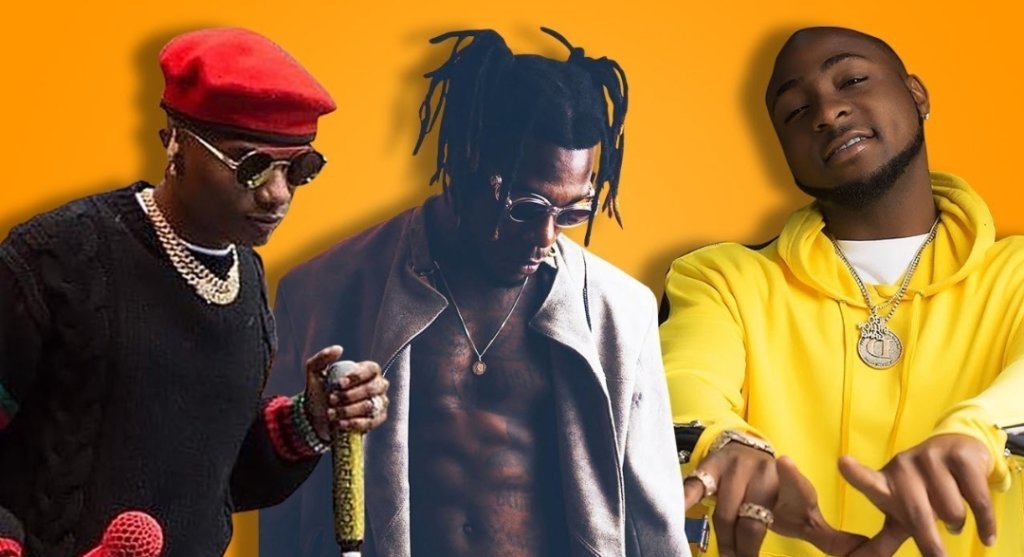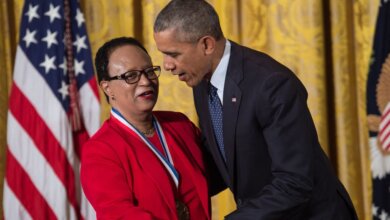IN THE SHADOW OF A GIANT: CAMEROON’S ILLS WITH NIGERIAN MUSIC

Like many Cameroonians, I am torn between two worlds — a French-speaking one and an English-speaking one. Navigating between these two worlds daily is hard enough; although for my own case, I like to think that I have acquired a particular ability at blending into whatever world I am in, at any given time.
That being said, it is in the English-speaking side of Cameroon I grew up and in which I am most comfortable.

The early years of my life have slices of Nigeria in it. I lived with my grandmother in a small town, and our next-door neighbour was a Nigerian immigrant. On weekend mornings, I would hear Nigerian high-life records blasting from the transistor radio placed strategically at a window that adjoined the little corridor that separated both our houses. My grandmother did not mind the music and it was also for her listening pleasure that it was played.
Barely two years later, the slices of Nigeria in my life moved from that transistor radio to the TV in my auntie’s house in Yaoundé. I remember one Nigerian movie in particular; Glamour Girls — starring a certain Liz Benson, which my cousins and I were forbidden to watch. In those early years, Nollywood had already strongly announced itself; and like a lingering visitor, has stayed with us until this day.

As a teenager, it was Nigerian urban music that stealthily ‘earwormed’ itself into our daily lives. It started with Danfo Drivers, then Tuface Idibia and P-Square and then Davido and Wizkid today. Now, as a working adult, it is the full-blown Nigerian culture that like the Harmattan, has blanketed Cameroon with its chilly presence; with English-speaking Cameroon being particularly affected.
Nigerians, despite themselves, and rather mostly inadvertently, have marketed their culture quite profusely. Nigerians are loud in a quiet way, and you can hear this muffled scream everywhere you go.
There is a silent loudness in the Igbo man at the Bamenda Main market, cajoling and entreating you into stepping into his stall to buy his wares, and there is a loudness in the the brightly-coloured clothes the men and women adorn in a typical, affluent Nigerian wedding. There is a loudness in Nigeria’s political history with its civil war and long list of political coups and military dictatorships, and there is a loudness in Nigeria’s movie industry — a mirror reflecting the ordinary everyday lives of the many Africans who see a strong familiarity in it.
There is a loudness in Nigeria being the most populous country in Africa and Nigerians emigrating en masse to every other country on the continent, and there is a loudness in the Nigerian diaspora’s excellence as well as in the numerous reports about its high profile conmen. There is a loudness in Nigerians occupying the better part of the digital media space in sub-Saharan Africa, and there is a loudness in the misery of the areas adjoining the lagoons of Lagos. There is a loudness in the corruption and the champagne showers flooding the corridors of influence in Abuja, and there is a loudness in the brutality of its power exerted on peaceful protesters. There is a loudness in the disparity between the affluence in Lekki and the poverty in Ajegunle.
Nigerians are loud; and to paraphrase Richard Dowden, Nigeria is a cauldron of superlatives, all fighting each other.
The average English-speaking Cameroonian grew up in close proximity to this deafening noise. Nigerians and English-speaking Cameroonians have a lot in common. The British Cameroons were once administered as part of Nigeria by the British. And when the tide of independence was flooding Africa in the early 60s, the British Northern Cameroons decided to join Nigeria, while the British Southern Cameroons decided to join French Cameroon.
This significant moment in the history of English-Speaking Cameroonians and the political and socio-cultural implications that ensued has left lasting scars and a stigma that has culminated in what is today the Anglophone problem.
Since 1960, the English-speaking Cameroon has been trapped in a tight space where it feels the influence of French Cameroon, bent at assimilating it into a culture of bureaucracy, unnecessary formality and lack of pragmatism. Also from that tight space, it looks at Nigeria and has wet dreams of what it could have been if it had existed as its own entity — so common are the two in their legal system, their language, and just generally their way of life.
But 1960 was sixty years ago. In that time, English-speaking Cameroonians have learned to live with French-speaking Cameroonians. Many have intermarried or have moved to live and work in areas that is not of their linguistic origin. I am a fruit born of such a cocktail — and this mélange, when seen on a grander scale, has led to what could be called a Cameroonian identity; a unity in diversity albeit heavily veiled under a cloak of tribalism, nepotism, and superiority complex — pretty much like every typical, dysfunctional democracy in Africa.
Despite the Anglophone crisis, many English-speaking Cameroonians still believe in this ‘Cameroonian Identity’ — one in which we all gladly celebrate the ephemeral victories of the Indomitable Lions, mumble loudly along to the lyrics of the hottest Makossa songs, and haughtily agree that we have the best cuisine in Africa. It is what many were born into and what they know. And while the discriminations against the Anglophone Cameroonian is still a very real thing, this ardent belief in the Cameroonian identity grows strong right beside the utopic dream of English-speaking Cameroonians seeing their place of origin existing as its own entity — as a federal territory for some, or as a completely autonomous place for others.
And while the shadow that the soft power of Nigeria’s cultural exportation cast on Cameroon covers almost the entire country, that cast on the Anglophone Cameroonian from their neighbour to the West is even darker. The geographical, legal, linguistic and socio-cultural proximity to Nigeria made Anglophone Cameroon the gateway for Nigeria’s cultural “colonisation” of Cameroon.
And Nigerians did not, themselves, need to do much. Although a large immigrant population of Nigerians (principally Igbo traders and refugees from the Biafra war) had settled in Cameroon for years, their strongest weapon in exporting their culture was a quiet but highly effective one — their movies.
The movie industry in Cameroon in the early 90s was, de facto, French-Cameroon controlled. And so when Nollywood VHS tapes (and later on VCDs) started pouring into Cameroon, Anglophone Cameroonians started watching movies to which they could easily relate to and identify with — Pidgin English used in these movies being a strong bedrock. In fact they related to it so much that Cameroon’s own brand of Pidgin English began taking a back seat in daily conversations.
Benskin became Okada. Sara became Oyinbo. Muna for tété became ajebo. Nyati-nyati became jejely.
The examples are many.
It’s not that Nigerian pidgin words had not exported themselves into Cameroon before, but this time, it permeated our daily interactions at an alarming rate and at a ginormous volume.
At the turn of the mid 2000s, just as the Cameroonian urban music scene as we know it today was born, the Nigerian urban scene was also being birthed. But while the Cameroonian scene grew at a snail pace, the Nigerian scene grew faster because the Nigerians had one thing that Cameroon still doesn’t quite have — proper infrastructure and money.

In terms of quality of music and historical back-catalogue from which to draw inspiration, Cameroon has nothing to envy of Nigeria. I daresay, and confidently so, that Cameroon beats Nigeria. Makossa was the reigning genre in Africa between the mid 70s to the late 80s. Cameroonians like Manu Dibango and Richard Bona were/are some of the leading musicians in the world in Afro Jazz. Cameroonian bass guitarists are some of the most revered and sought-after in the world.
But of what use is that without infrastructure and money?
Nollywood movies had already set the stage for contemporary video directors like Clarence Peters to thrive on. And Nigerians are far more willing to bet on the arts than Cameroonians — many used that as a funnel to launder their money, but the money flowed in no less, and in dizzying amounts.
For the Cameroonian who believes in the Cameroonian identity, and who knows the potential and the many rare gems that are in the market, being dwarfed by Nigeria today at a game which they were masters of in the 80s can be particularly infuriating; especially when that thought is sprinkled with a bit of chauvinism.
It doesn’t help that the very first victims of — what could be called in a hyperbolic form- the erasure of the Cameroonian identity are the Anglophone Cameroonians. It was only natural that the first signs of discontent and public outcry came from this community, and it was impersonated by CY International, the comedian.
When you look at it keenly, you begin to see where he, CY, comes from, and beyond his rash delivery and obvious lack of tact, you begin to understand the man and can even empathise with him.

Today, what has been grossly termed the ‘ban of Nigerian music in Cameroon’ is simply nothing more than an individual quest for an identity, expressed by small groups of people who first, as Anglophone Cameroonians, feel lost in their own country, and who secondly, as Francophone Cameroonians or mixed Cameroonians (like myself), are wary of the sandstorm that is globalisation, erasing whatever patterns had carved themselves on the dunes of the singular and complex patchwork we had come to see as a Cameroonian identity.
And no one feels the pinch more than English-speaking Cameroonians who holds fast to the Cameroonian identity; him already being a stranger in his own homeland.
In the vast global village that is our world today, people are trying more than ever to mark themselves apart. Everyone is holding strongly onto a mast that carries the flag of his personal and collective identity. The flag demarcates his territory and without a territory, you are a lost soul in this vast world.
Cameroonians do not want to ban Nigerian music. Cameroonians do not even care about Nigerian music in that sense. Cameroonians just want to give a shine back to the worn out flag that is borne on the mast which they are holding firmly, yet feeling their grip slipping away. The oxymoron that is their current predicament does not feel comfortable.
And that is Cameroon’s problem, if one may call it so, with Nigerian music.
Written by Daniel Ngongang
Oral Ofori is Founder and Publisher at www.TheAfricanDream.net, a digital storyteller and producer, and also an information and research consultant.




